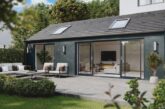
Triple glazing has to be better…right? Well, yes and no…. it isn’t as simple as simply adding a third pane of glass to make everything at least a third better.
There has long been an assumption that triple glazing must be better than double glazing…of course it does, as you’re adding another pane of glass which makes it at least half as good again, right?! Well, the truth is that if it was that simple then the window industry would have been all over it like a rash…
One or two retail home improvement companies do offer triple glazing and one of them at least, actually offers it for no extra charge. But in the main, the industry doesn’t push it and homeowners have never really gone for triple, perhaps because they assume that it will be too expensive…either way, as a window and door manufacturer, we offer triple on a range of products but if it was as simple as it being that much better at everything and with no downsides, we wouldn’t bother selling double anymore.
Without getting into the physics of it, I will do my best to explain…
Introducing a third pane of glass – especially coated glass – will, of course improve the thermal performance of the window, in broad terms from around 1.4 W/(m²K), which is the minimum required by the recently revised Building Regs, to somewhere below 1.0 W/(m²K), when manufactured to the same standard and from similar materials. Sound attenuation – noise control – such as for homes facing a busy road, for example, will be improved whilst security is better by the simple expedient of the would-be burglar having an additional pane of glass to hack through.
However…
Some window types and styles cannot be fitted with triple units due to their design – such as slimmer aluminium frames, for example. And the weight is, of course, significantly greater, which has implications in handling and fitting, but also in terms of the load bearing of the structure they are to be installed into. Triple glazed units installed in Vertical Sliding Box Sash frames can make the simple act of opening them significantly more onerous too.
Triple glazed windows are, of course, more expensive – perhaps as much as 40% again – which means that they will take considerably longer than double glazed frames to pay back the investment in terms of energy savings, even with the cost of heating bills as they are. Further, triple glazing has a far higher carbon footprint created in its manufacture – as much as 40-50% more – which must be borne in mind if overall environmental impact is of concern.
Sound attenuation may, of course, be a compelling reason to install triple glazed units, but these are likely to be effective on the areas facing the noise source and unnecessary elsewhere. It is also worth bearing in mind that triple glazing can make rooms echo as noise cannot escape either, so fitting specially manufactured double-glazed units with laminated glass make more sense.
As for security, few burglars will attempt to smash their way into a house through the glass irrespective of how many panes are fitted, due to the noise and commotion created. There are usually far easier options for the would-be aggressor.
So…
Modern double glazing is highly efficient, with glass that is coated with fine particles that improve thermal performance close to that achieved by similarly produced triple units, simply due to the nature of UK weather conditions: in countries where temperatures plunge below zero for much of the winter, it’s a no brainer. But in mild British winters, triple glazing installed to exposed north and west facing elevations will usually be all that is required to justify their choice at all. Double is usually more than enough in the UK.
Special laminated ‘sound attenuation’ glass will often be more effective than an additional pane of standard glass to reduce noise pollution, whilst security may be improved by specifying laminated glass.
Triple over double can therefore never be an automatic choice: even if the spec is for the ‘most efficient windows that money can buy’, there are other considerations, down-sides in fact, to having an extra pane of glass fitted in every window in the house.
An obvious case for using triple however, where cost is no object, is for areas with large spans of glass – such as sliding patio doors – where the thermal benefits and security may well outweigh other considerations. For average homes with average windows, think ‘double’, but spec them well.
For further information on Quickslide visit www.rdr.link







